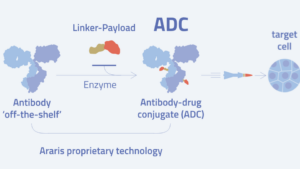
Obesity: Roche with first clinical data after US$2.7bn deal
Obesity candidate CT-388, which Genentech added to Roche's pipeline with the acquisition of Carmot Therapeutics, is at least not a disappointment, according to new trial data.
Following the acquisition of Carmot Therapeutics in December 2023 for US$2.7bn biobucks (US$400m upfront), Roche has now announced the results of the completed Phase I trial of its Phase Ib GLP-1/GIP agonist CT-388, codenamed RG6640, into its own pipeline. Together with CT-388, Roche had acquired the oral Phase I GLP-1 agonist CT-996 (RG6652) for the treatment of obesity in adults and the Phase II GLP-1/GIP receptor agonist CT-868 (RG6641) for the treatment of diabetics with obesity.
Over 24 weeks,weekly subcutaneous injections of CT-388 led to a median weight loss of 18.8% compared to placebo. More specifically, 100% of patients lost more than 5% of their weight, 70% achieved more than 15% weight loss while 45% lost more than 20% weight versus placebo, what is comparable to clinical results achieved with GLP-1/GIP agonists from competitors. In prediabetics CT-388, which showed that characteristic side effect profile of this drug combo, normalised blood glucose levels.
With currently one billion patients, obesity is one of the most urgent health challenges in the world due to life-threatening comorbidities, such as type 2 diabetes, cardiovascular diseases, steatohepatitis or chronic kidney disease. Besides other drug combos currently under clinical investigation, CT-388 belongs to the second generation of incretin-combination therapies such as Eli Lilly’s blockbuster tirzepatide that downregulate blood sugar levels and reduce appetite due to effects seen in the hypothalamus-based appetite and reward centre and other unexpected sites in the brain. Those combos target and activate two specific receptors in the body, GLP-1 and GIP, which integrate nutrient-derived signals to control food intake, energy absorption and assimilation. It is hypothesised that the dual targeting effect of CT-388 could result in a meaningful durable glucose reduction and weight loss, in addition to a favourable safety profile.
An additional cohort from the ongoing placebo-controlled Phase I trial of CT-388 will evaluate obese patients (BMI>30 kg/m2) with type 2 diabetes over a 12-week treatment duration. Roche expects data from this additional cohort in H2/2024.
Analysts at Global Data predict that GLP1/GIP agonists could pose a threat to market leader Novo Nordisk’s diabetes/obesity blockbuster semaglutide. With a potential weight reduction of more than 24%, Amgen’s GLP1 agonist/GIP antagonist AMG-133 looks much more promising, at least to GlobalData analysts, although no one can currently say anything about the exact mechanism by which this is achieved.
Following the approval of semaglutide and – two years later – tirzepatide, IQVIA reports that a total of 116 obesity candidates/combinations are currently in clinical trials: 61 in phase 1, 47 in phase 2, eight in phase 3. While the most of these candidates have to be taken live-long, a novel approach aims at establishing obesity resistance by durable changes of the patients’ energy metabolism. To get more information on the heated field of obesity, read our cover story online or order the print issue of of European Biotechnology Magazine to be published on 24 May.


 Araris Biotech AG
Araris Biotech AG Roche
Roche BioNTech SE
BioNTech SE